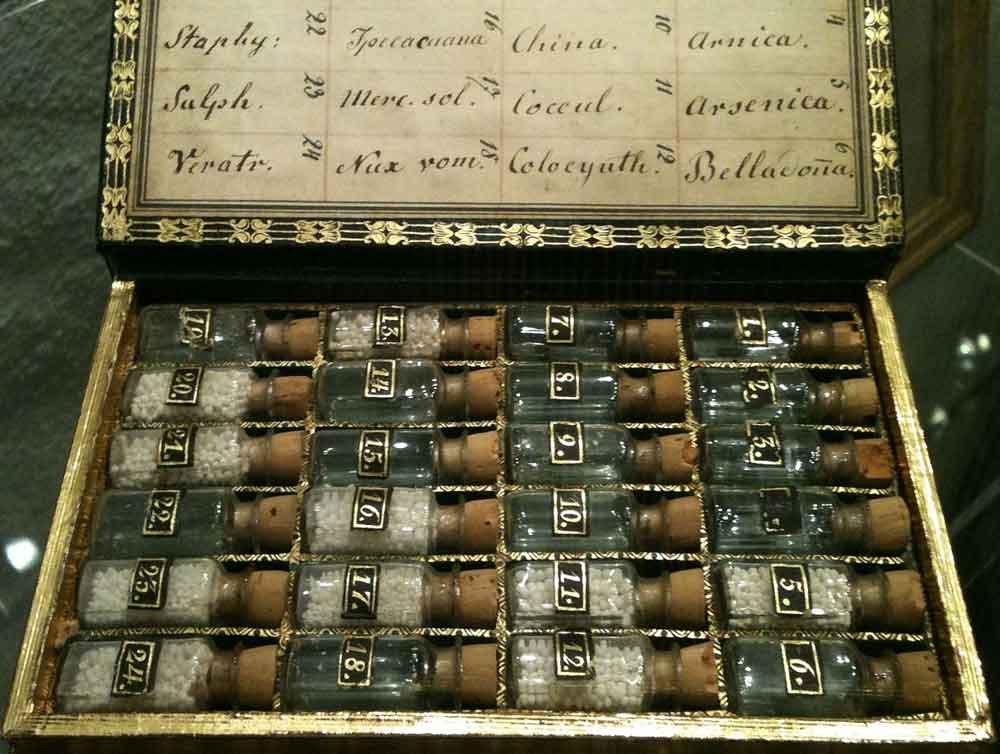
About Homeopathy
A little over 200 years ago, a visionary named Samuel Hahnemann decided to do something about the generally toxic practices commonly used in conventional medicine. At that time, Allopathy, or “heroic medicine” was the dominant medicine used, and it still is today. Hahnemann eschewed practices such as giving large quantities of toxic substances, bloodletting on already-drained people and other such horrors we laugh about now. It was very obvious to him that the common Allopathic practices of the day did more damage to patients than doing nothing at all.
He began to look deeply into methods of medicine that caused more trouble, and what actually cured or healed. In this process, he discovered the Law of Similars. The word Homeopathy means “similar suffering.” In our world where we counter fire with ice and sour with sweet, the idea of treating a condition with a substance that can cause the same issue may be totally counterintuitive. But here’s the rub:
The body cannot be host to two similar illnesses at the same time.
It has been observed by doctors from time immemorial that when someone gets ill, and a more virulent similar illness comes along, the first illness stops in its tracks, the second illness takes it course, and the first illness resumes where it left off after the second, more virulent illness completes.
Properly chosen Homeopathic medicines, which are highly diluted, create an artificial or “hollow” illness that nudges out the original disease. And Homeopathic medicines “leave no trace,” (aka side effects) which are all too common after use of Allopathic medicines.
During Hahnemann’s process of discovery, he began to experiment on himself with different substances. The first remedy he tested on himself was Peruvian bark (China officinalis), which is the source of Quinine, still the most common treatment for Malaria. In giving himself repeated doses of Peruvian bark tea, he began to experience intermittent fevers and other malaria-like symptoms. Based on the Law of Similars, he reasoned that if it made a healthy person sick with malaria-like symptoms, it would have the ability to heal a sick person with malaria. In his work with sick patients, this proved to be true.
In fact, Samuel Hahnemann introduced the Scientific Method into the field of medicine. He was not satisfied with the use of theory and preferred to base medicine on results which had been proven by scientific experiments.
Like cures like: Well-chosen Homeopathic medicines stimulate the body to heal itself. Samuel Hahnemann, the founder of Homeopathy, discovered and expounded on a great truth. The body cannot have two similar diseases at the same time. A highly-diluted Homeopathic medicine that in gross form may cause serious disease, can quickly and effortlessly nudge out a similar condition.
Little-known facts about Homeopathy
Homeopathy pioneered use of the scientific method in the field of medicine. In 1897, 40 years before Allopathy, Homeopathy started to use masked placebo trials.
During the famously terrible 1918 flu, patients treated with Homeopathy died at a rate of only 1.05%, while patients treated with Allopathy died at a devastating rate of 30-40%. What is remarkable is that even then, Homeopathy was used as a last resort by most people. The 1% of people who died after Homeopathic treatment had already used Allopathy and got sicker from it. During that epidemic, the use of Aspirin caused pneumonia. Early, sole use of Homeopathy could have saved thousands of lives.
Scientifically speaking, Homeopathy has by far better cure rates for just about any known condition. Other than for a severe accident where immediate Allopathiic help is indicated, a person can manage their health for their whole life using only Homeopathy—and thrive.
Over 100 million people in India use Homeopathy as their sole form of medicine. They are among the healthiest people I have personally met.
In India, several forms of alternative medicine are given the respect they deserve. AYUSH is India’s “ministry of alternative medicine,” so to speak. Does that sound like Ministry of Magic?
Homeoprophylaxis produces better rates of immunity than injections for childhood disease. For more information, read the studies done by Dr. Isaac Golden.
Homeopathy for Healing:
Managing your health with Homeopathy leaves behind no nasty surprises the way conventional medicine does. Of course, in true emergencies, do what you must. But if it isn’t life threatening, consider using gentler methods. Even when something IS life-threatening, you can treat someone homeopathically on your way to the hospital, and you may or may not need treatment once you have arrived.
If you have chronic conditions, consider managing these with Homeopathy. Homeopathy can sometimes bring about full cures where Allopathy can only offer minor symptom management and palliation. It can take time to find the right remedies and effect a total cure, but willingness, diligence and patience can pay off greatly.
Homeopathy for Preparedness:
For being prepared for natural, biological or man-made disasters, you can hardly do better than Homeopathy. Homeopathy can remedy things that Allopathy can’t touch, and it has a far better track record. (See above re: survival rates in the the 1918 flu. Become a member to book appointments or purchase kits.

